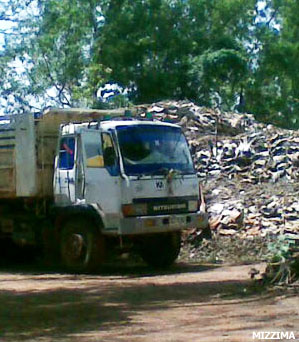Chiang Mai (Mizzima) – More than 20 workers from the Thuzana Pwint Mining Company Limited have suffered lead poisoning related to lead mining in the Three Pagoda Pass area on the Thai-Burmese Border in Karen State, according to mine workers.

The workers were stricken because they used river water near their mining activities, and the company has not accepted responsibility for their condition, according to the workers.
‘Protuberances have appeared on their skin. They feel dizzy and they vomit. The company has not accepted responsibility so they can only afford folk medicine’, a worker told Mizzima.
Another worker said, ‘I saw some workers…their skin had turned red. They have high fever. But, they aren’t in mortal danger’.
With the approval of the Ministry of Mines and an informal agreement with the Karen National Union (KNU), mining companies including Aung Myay, Thapyu, Mya Than, Aung Shwe, Nawarat and Thuzana Pwint are conducting lead mining operations in Karen State. The companies need KNU approval because the lead-mine areas are controlled by the KNU.
In the past two months, Thuzana Pwint Company has produced a total of 500 tons of lead from the 600-acre wide Thinbawpin lead mine area, which is 30 km northwest of Three Pagoda Pass, according to sources close to the company. The company received a mining permit early this year.
Lead mining companies pile bags of lead in eight locations around Three Pagoda Pass before the lead is exported to Thailand. Residents said that each pile comprises about 600 bags of lead and rain can cause seepage into the ground or nearby water areas.
Among the lead companies in the KNU controlled area, the Thapyu Mining Company Limited is the most productive. It has produced lead since 2003 and has a lead refining factory in Taung Wai Ward in Three Pagoda Pass.
A KNU officer said, ‘Many companies have asked us to let them produce timber and lead in our controlled area. We have banned timber production. We granted the permit to produce lead only after we asked residents for their opinions’.
Authorities ordered a lead refinery factory closed in 2005 after contamination of the Oodaung Lake and wells in the Three Pagoda Pass area, which led people to suffer lead poisoning and the death of fish and animals.
A doctor who lives in Three Pagoda Pass said, ‘The lead production processes produce sulphuric acid. And that can lead to sulphuric acid rains. When a person suffers the poisoning, his or her skin turn red and they have all sorts of aches and pains. And the person’s bone marrow can be damaged. Lead poisoning can kill fish. The worst thing is that it can damage a human liver and lungs and make the person anemic’.
Unrefined ore which comprises about 40 percent lead is exported to Thailand at a price of up to 30,000 baht (US $1,000) per ton.


